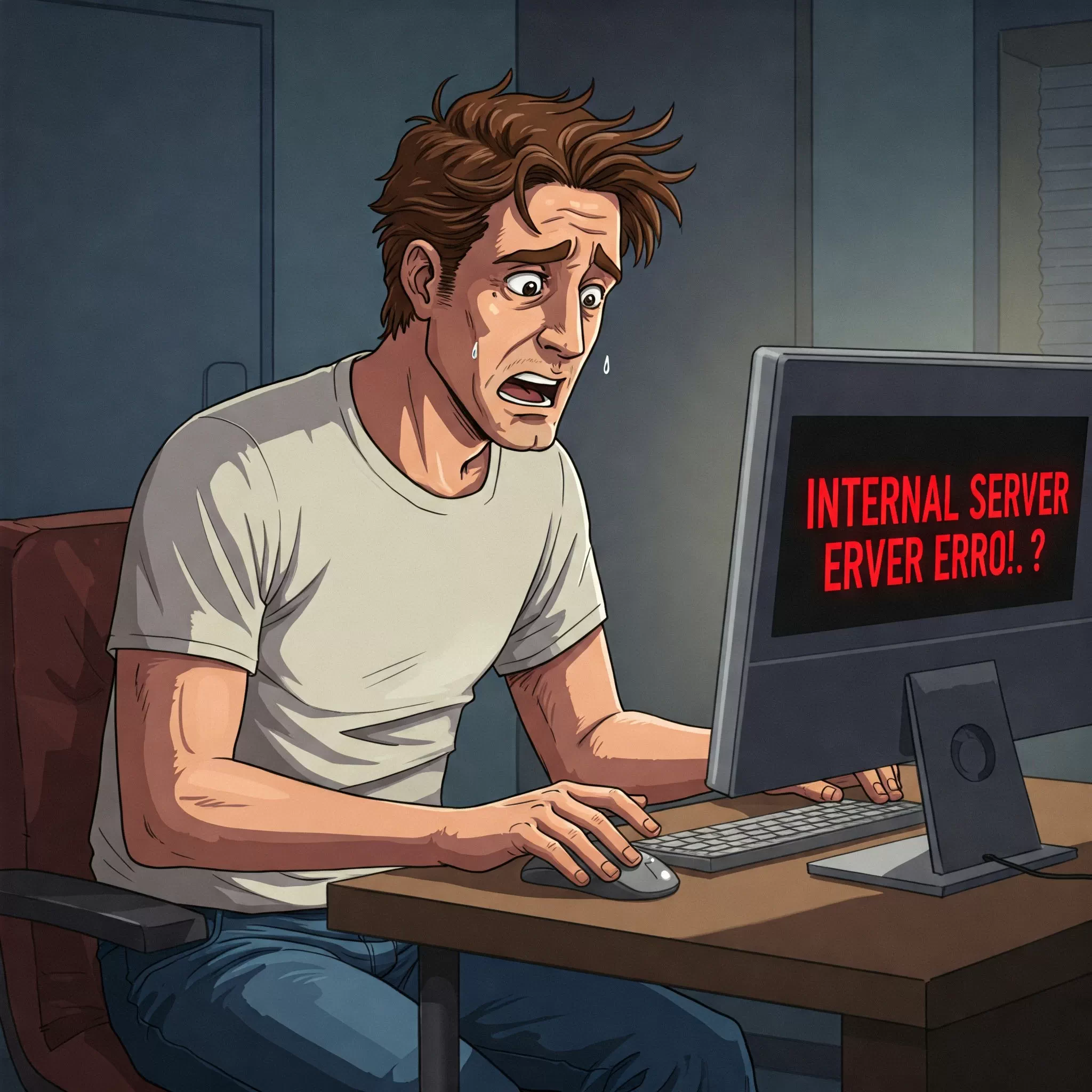Poor Barnaby Bingley, the theatre manager of the Thespian Theatre in Upper Bottomley, was at his wit’s end. The ancient walls of his beloved theatre seemed to groan in sympathy with his tech-related woes. Indeed, the theatre website hadn’t been a priority, and maintaining it even less. Now, this crucial tool for the theatre was throwing up more errors than a Shakespearean tragedy has plot twists. All of a sudden his screen was screaming, “404 not found,” “500 Internal server error,” “Database connection failed” — the messages flashed on his screen, mocking his attempts to sell tickets for the upcoming production. Juggling bookings, social media, and the practicalities of a theatre that was quite literally falling apart at the seams was enough, without the added headache of confusing tech jargon. Undoubtedly, Barnaby felt like he was trapped in a never-ending tech rehearsal with no interval in sight.
But fear not, for even Barnaby, with his self-confessed technophobia, managed to navigate the world of venue website development and maintenance. And you can too. This guide will demystify the process of building and maintaining a website for your theatre, ensuring that you’re selling tickets and engaging with your audience, rather than battling with bugs. After all, in this digital age, a well-functioning and user-friendly website is no longer a luxury; it’s a necessity.
Choosing your platform: Your stage, your way
Initially, you need to choose the right platform as the first step in creating your online presence. Think of it as selecting the stage for your production — it needs to suit your needs, your budget, and your technical skills. Here are a few options:
- Website builders: These are user-friendly tools (like Squarespace, Wix, or Weebly) that allow you to create a website with drag-and-drop interfaces. They’re ideal for those with limited technical skills and offer a range of templates to get you started;
- Content Management Systems (CMS): WordPress is the most popular CMS, offering immense flexibility and a vast library of plugins. While it requires a bit more of a learning curve, it’s a powerful option for venues that want to scale their online presence;
- Bespoke development: For venues with specific needs, less technical know-how, or larger budgets, hiring a web developer to create a custom website might be the best option. This offers the most control and the ability to pass off design and technical specifications to someone who knows what they are doing, but is also the most expensive and time-consuming; and,
- Ticketing platforms: Some ticketing platforms offer website building tools as part of their service. This can be a convenient option, integrating your ticket sales directly into your site. But usually it offers less control over the look-and-feel of the site, and less control over what you can use it for.
Eventually, Barnaby, after much deliberation (and several cups of tea), opted for a CMS, allowing him greater control over the site for Thespian Theatre.
Key website features: the show must go online!
Once you’ve chosen your platform, then it’s time to think about the essential features your venue website design needs. These are the elements that will make your website a star performer:
- Online booking: Emphatically, this is non-negotiable. Allowing patrons to purchase tickets directly through your website streamlines the booking process and increases sales;
- What’s on calendar: A clear and up-to-date calendar of events is crucial. Make it easy for visitors to see what’s playing and when;
- Contact form: Provide a simple way for people to get in touch with you for enquiries, feedback, or group bookings;
- Mobile responsiveness: Your website must look and function perfectly on all devices, from desktops to smartphones. Many people will book tickets on the go;
- SEO (Search Engine Optimisation): This helps people find your website through search engines like Google. Basic SEO includes using relevant keywords, having clear page titles and descriptions, and ensuring your site loads quickly; and,
- High-quality images and videos: Visual content is key to showcasing your venue and productions. Use professional photos and videos to capture the magic of theatre.
Barnaby made sure Thespian Theatre’s website included all of these, transforming it from a digital disaster to a box office triumph.
Keeping it running smoothly: maintaining your theatre website backstage
A website isn’t a “set it and forget it” affair. Regular website platforms for theatres require maintenance to keep them running smoothly and securely. Think of maintaining a theatre website as the backstage crew that ensures every performance goes off without a hitch. Here are some essential tips:
- Regular backups: Back up your website regularly. If something goes wrong, you can restore it to a previous version;
- Software updates: Keep your CMS, plugins, and themes up to date. These updates often include essential security patches and bug fixes;
- Security measures: Install security plugins or tools to protect your website from hackers and malware. A compromised website can damage your reputation, lose you ticket sales, and wind you up in a lot of trouble if customers’ personal data is lost;
- Content updates: Keep your content fresh and relevant. Update your calendar, news, and production information regularly;
- Website analytics: Use tools like Google Analytics to track website traffic and user behaviour. This data can help you understand what’s working and what’s not; and,
- Testing: Regularly test all the features of your website, especially the booking system and contact form, to ensure they’re working correctly.
Barnaby learned this the hard way after a plugin conflict crashed the Thespian Theatre’s website on the opening night of Hamlet! Now, he has a strict maintenance schedule. Now, he knows that security updates can’t be left until later. Maintaining a theatre website is as important as building it in the first place.
Curtain up on a new era of maintaining the theatre website
No longer does Barnaby quake in his boots at the mere mention of HTML or CSS. He now confidently manages Thespian Theatre’s website, selling tickets, engaging with patrons, and showcasing the magic of theatre to a wider audience. He even live-tweets during performances (much to the initial horror of some of the older actors!)
Developing and maintaining a theatre website doesn’t have to be a daunting task. By choosing the right platform, focusing on essential features, and implementing regular maintenance and updates, you can create a powerful online presence for your venue. And if Barnaby can do it, anyone can.
But if the prospect of building and maintaining a theatre website gives you palpitations, then you can always call Redcentaur, who are happy to help you with your needs.
For more help…
The ultimate guide to building a buzz: essential strategies for a theatre website
Must-have theatre website content





